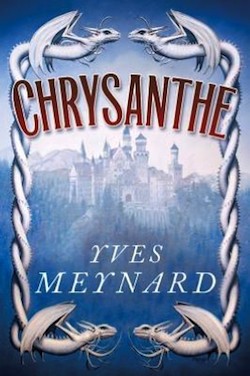Fantasy has family trees and most books show their pedigrees visibly, but it’s hard to say where Yves Meynard’s wonderfully original new novel Chrysanthe belongs. It’s a little like Zelazny’s Amber books, with characters moving through ever-shifting realities towards and away from the one real world. There’s some Dunsany and some Gene Wolfe in its pedigree. I suspect it owes something to E.R. Eddison. But it’s not a lot like fantasy as we normally come across it, and it’s clearly coming out of very different traditions. Fantasy as a genre has a narrow center and lots of room at the edges for people doing things that are different. This is definitely different.
I could write about Chrysanthe as if it were a much more normal book. There’s a lost princess, and a rebellious prince, and heroes, and knights, and magicians and a war. There’s a shape shifter and a heroic captain of a magic airship. There are six demons including a seven-limbed demon and a giant terrapin. There’s a spell that could destroy the world and a little girl with an imaginary friend who isn’t as imaginary as all that. There’s a huge castle made out of blue stone that rises on a stem like a flower. There are epic confrontations and tragic deaths. But it’s really a book about coming to terms with who you are.
Chrysanthe is beautifully written with a sure control of register, and for the most part it’s written in a way that would lead us to call it high fantasy. It’s not just that we have kings and knights and heroes, they are the everyday staples of fantasy. It’s that they speak in elevated languages and have vast passions. They care, they scheme, they defend, and everything is described with crystalline precision.
It is sometimes granted the kings of Chrysanthe to feel the will of the Law as a man may feel an impending storm by the taste of the air or the colour of the sky. For months now King Vaurd had been feeling his destiny shaping itself. And much as a man may prepare for a storm yet is powerless to stop the wind and the rain, so it was with him, who spent hours unsleeping, sick to his stomach with worry, unable to halt the march of events.
There’s one character though who doesn’t live at that altitude. The book begins with Christine, a princess of Chrysanthe who has been kidnapped and trapped in a made world. This world is much like ours, with charming differences. Christine is four years old and cries herself to sleep every night while her imaginary friend tells her bedtime stories in which she is a true princess. Christine talks idiomatic English and is brought up to think of herself as ordinary, even damaged. She’s on a different scale from the world to which she is heir.
The problem with crystalline precision and beautiful prose is that it can have a chilling and distancing effect. Instead of feeling close to the characters, it can feel like watching them through the wrong end of a telescope. And the problem with having many made worlds and one real world is making the real world seem sufficiently real—a problem compounded when one of the imaginary worlds is so closely akin to the real real world and the real world is more like a fairytale. Both of these problems are mitigated by the focus on Christine and her personal journey. She comes from a world that, like ours, is a globe circling a ball of fire. Going to a world where the sun literally extinguishes itself in the sea every night and the stars are close enough to touch is as strange for her as it would be for us. After she has been in Chrysanthe for a little while she realises that nobody else there knows the word “okay.”
Yves Meynard is also an award-winning author in French. He’s totally and completely bilingual, and he once told me that he has story ideas in one language or the other. I’m very glad he had this idea in English so I could read it. He originally conceived of this book as a trilogy, but it seems to be a very good decision to publish it in one volume. It’s a long novel, 492 pages, but it’s the complete story. I think it benefits from the opportunity to read it all at once and see the shape of the whole thing.
Jo Walton is a science fiction and fantasy writer. She’s published two poetry collections and nine novels, most recently Among Others, and if you liked this post you will like it. She reads a lot, and blogs about it here regularly. She comes from Wales but lives in Montreal where the food and books are more varied.










